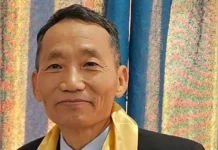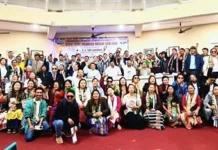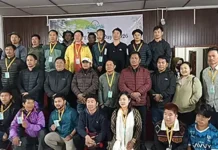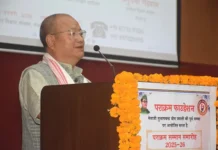[ Samhita Barooah ]
While cruising through the length and breadth of Naga Hills for work, I had never experienced the political fever. But this time with the elections due, the political parties seem to be full of candy boxes luring their respective so-called vote banks in both rural and urban Naga Hills.
I witnessed diverse changes in the atmosphere of the hills.
While travelling through shared taxis, people seemed tight-lipped about the choice of candidates but at the same time they were looking for interesting political gimmicks.
Richest national parties floated the state with huge banners, posters and photos of their candidates in the cities of Kohima and Dimapur. In spite of most dilapidated road conditions along the Dimapur-Kohima-Phek highway, people seemed to be travelling for work, needs and politics most prominently.
There were check posts set up by both police and public organisations like the women societies to check the taxis coming from outside for prohibited alcohol. This was part of the clean election campaign initiated by the NBCC. Every bag, seat, doors and storage spaces were thoroughly checked in all the vehicles. Some of the passengers commented that those who are foresighted in the illegal liquor business and also in politics, they must have stocked up the alcohol beforehand so that the voters can be lured. The price of a bottle of whisky has shot up from Rs 350-400 to about Rs 800-1000 now.
All the party candidates and workers were travelling through these roads in their high-end SUVs and heavy vehicles. When I reached a village in Phek district on February 14, 2018, I saw that there were many vehicles around the main market square. Very strangely, the only ATM and bank stopped releasing cash. In fact, the village had not seen cash transactions through ATM in the last whole week as the bank officials could not be accompanied to procure cash from the district headquarters of Phek by security personnel, who were occupied with election duty.
People faced harrowing times to make ends meet for daily expenses and had problems with their children’s school admission fees deposit also.
I also noticed that the clean election campaign flags were fluttering in some of the homes of the people of the village. It was meant that the members of the families in that home would not accept any cash in lieu of votes during the elections.
By evening, there was an announcement in the local PA system of the village council that there will be a political party meeting in the village Theza or meeting place inside the village, the next morning by 6 am.
I attended the election campaign meeting where a village leader was contesting from the Chizami constituency. In fact, the previous day, all the five candidates participated in the common platform meeting which was organised by the Chakhesang clean election campaign. In the rural context, all the candidates from every political party shared the centre stage while addressing the local voters.
This time, there was a female candidate in the Chizami constituency which was historic for Nagaland. At 35, she is a farm entrepreneur ready to begin her political journey in her home state to be able to stand up for the critical concerns of women in Nagaland.
I attended one of the campaign meetings in the village which started early in the morning by about 6.30 am. All the prominent men in the village sat with the candidate and the office bearers of the congress party. Women from the village council and women society attended the meeting. The spokesperson from the Indian National Congress shared in the local dialect about how important it was to support one’s own leaders in the elections. He appealed to the public to support the congress candidate.
I thought that voting choices were determined by clan, class, political party affiliations, religion and ethnicity based parameters. While speaking to different families, I was informed about whom they would like to see as their next leader, most of them said they would vote according to the head of the family. Some people thought that if a candidate was from their village or community then they needed to support them whether they liked them internally or not.
There were media reports from other districts of Nagaland like in Mokokchung where women were beaten up on their legs for supporting other candidates who were not from their clan.
Such news and pictures were spread through social media like Whatsapp to build an atmosphere of fear psychosis amongst the women voters in Nagaland during the elections. In the villages, candidates literally met the people in their homes to seek votes. Some parties also organised meetings to raise vote appeals to people in diverse ways.
When I went to Dimapur to attend a political leaders and public interface which was organised by the collaboration of the Morung Express, Heritage Publishing House and thenagarepublic.com, I witnessed another perception of urban voters.
All five party leaders from the major political parties of NPF, NDPP, NPP, INC and BJP were present in the interface. The venue was jam packed with students, youths, professionals, women, non-Naga representatives from resident welfare committees and generally people from diverse walks of life. The event was captured live on camera and the moderators were from the print and digital media.
Seasoned public speakers from both the parties and the audience presented their views. The moderator had to balance the views of both public and the party leaders but also made very crucial interjections to ensure public commitment from the political leaders. There were issues of roads, governance systems, tussle between bureaucrats and political leaders, public libraries, student’s scholarship, violence against women and women’s participation in decision making bodies, healthcare infrastructure and issues of peace accord solution before the elections. The party leaders managed to answer a few of these questions after referring to their manifestoes and then they kept focusing on their party symbols. They promised to resolve all aberrations within the first few months of coming to power on the condition of being voted into power.
I kept wondering what could be the plight of farmers, weavers, wage earners, rural and urban poor, disabled, mentally challenged, addiction affected, disaster affected and displaced persons and fragile sustainable ecology as most of the audience demanded industries, roads, peace accord and infrastructure.
None of the political parties had a woman candidate or a representative in the panel discussion. Even the only independent woman candidate of Nagaland also could not attend the discussion due to her tight schedule in the rural pockets.
When I was about to leave Nagaland, I got the news of a weird campaign tactic came to light in some villages in Phek district. The party poster was made with the image of Narasimha avatar of Lord Vishnu which was disturbing and violent. The caption said, ‘Vote for BJP Nagaland for money’.
There was another poster of undivided India with the image of Goddess with the Trishul with Bharat Mata in it and the name of the BJP candidate. Another computer printed poster in black and white writing said, “I am a Naga and I am a Christian and knowing all facts of what is going around with Christians in India I will never vote for ‘BJP party’ it will be a spiritual suicide for me. So save Nagaland before you lose one of the largest Christian states in India. Don’t get fooled by Bharatiya Jumla Party, BJP.”
Now these posters were pasted on the entrance gate pillar of the Church to distract people. If these posters are posted by miscreants then nobody bothers but if they are used as propaganda material then both BJP and the opposition parties are losers as voters are not impressed with such issues. In fact an FIR has been lodged to address this issue immediately after it was circulated widely through social media.
In a recent news report, one of the BJP ministers said that religion is above politics and the two will not be mixed but somehow in this context it is an evident dichotomy.
So, however much parties claim to be corruption-free, fair and clean in front of cameras, radio, websites, on the ground it is a matter of fear, money, power, accusations, clan relations and tall claims which impress or suppress the voters.
I hope that the election in Nagaland does not become a masculine display of armour, fear, power and money alone, but also a reason for people to believe in the democratic system of fair elections. (The contributor is a Researcher)





